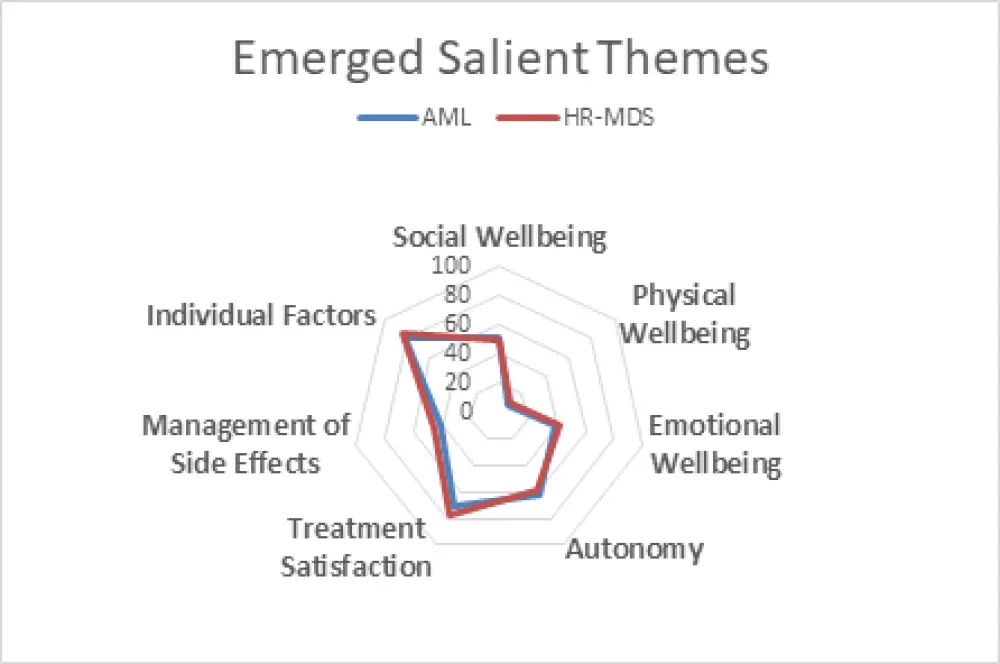All content on this site is intended for healthcare professionals only. By acknowledging this message and accessing the information on this website you are confirming that you are a Healthcare Professional. If you are a patient or carer, please visit the MDS Alliance.
The mds Hub website uses a third-party service provided by Google that dynamically translates web content. Translations are machine generated, so may not be an exact or complete translation, and the mds Hub cannot guarantee the accuracy of translated content. The mds and its employees will not be liable for any direct, indirect, or consequential damages (even if foreseeable) resulting from use of the Google Translate feature. For further support with Google Translate, visit Google Translate Help.
Now you can support HCPs in making informed decisions for their patients
Your contribution helps us continuously deliver expertly curated content to HCPs worldwide. You will also have the opportunity to make a content suggestion for consideration and receive updates on the impact contributions are making to our content.
Find out more
Create an account and access these new features:
Bookmark content to read later
Select your specific areas of interest
View MDS content recommended for you
Hot off the press | Understanding patient’s burden, quality of life, and alignment of patient-reported outcome measures to capture changes in high-risk MDS/AML
Treatment considerations regarding the quality of life (QoL) impact for patients with high-risk myelodysplastic disease (HR-MDS) and acute myelogenous leukemia (AML) are challenging due to the lack of quality data to properly inform treatment decisions.
Anthony Messina, GW University’s School of Medicine & Health Sciences, Washington, DC, US, is part of the research team of a study that aims to improve how QoL is measured for patients living with MDS and AML. The purpose of the study was to explore the treatment values, goals, needs, and symptomatic experiences of patients diagnosed with HR-MDS and AML in the treatment of their condition, specifically regarding health-related QoL (HRQoL). By utilizing concept-elicitation interviews and surveys, relevant domains were identified based on the lived experience of people treated for HR-MDS and AML. A total of 17 participants (AML, n = 8; HR-MDS, n = 9) were enrolled, with both subpopulations (AML and HR-MDS) sharing similar perspectives. Seven salient themes (Social Wellbeing, Physical Wellbeing, Individual Factors, Emotional Wellbeing, Management of Side Effects, Treatment Satisfaction, and Autonomy) emerged from a thematic analysis, considering both recurrence and importance of individual codes and important and influential factors for HRQoL (Figure 1). Treatment Satisfaction, maintenance of Autonomy, and Individual Factors (such as health status, comorbidities, location of care, socioeconomic status, etc.) were found to be the most salient when discussing QoL and wellbeing.
Figure 1. Salient themes*

*Unpublished raw data provided by Messina et al.
In efforts to improve how QoL is measured in the research setting, the full results from the study will be presented to a Delphi panel to determine a suitable patient-reported outcome measure (PROM) that aligns with the identified domains and concepts. The anticipated outcome of the Delphi study is to confirm the alignment with an existing PROM that closely measures the important and influential factors affecting the QoL of this population, or to determine if no existing PROM is suitable based on the patient-reported concerns.
Recruitment has begun for established experts in this field, whose judgments on the appropriateness of the content included in an established instrument for this population, will be highly valued. The Delphi panel will be provided with a presentation on the results from the above-mentioned portion of the study (analysis of patient-reported concerns, values, goals, and influential factors) to help inform their decisions. Specifically, the panel will be asked to consider each of the following attributes of an instrument: conceptual framework, HRQoL domain, clinical relevance, acceptability and practicality, validity, reliability, responsiveness to change, and interpretability.
Delphi participants will be asked to complete two brief questionnaires, rating potentially suitable PROMs in an online survey. Prior to the first questionnaire, they will be supplied with six potentially suitable PROMs and a presentation of the results from the first part of the study (patient interviews and surveys).
If you would like to learn more, please visit the Delphi study information sheet.
If you would like to register for the study, please do so here.
Please indicate your level of agreement with the following statements:
The content was clear and easy to understand
The content addressed the learning objectives
The content was relevant to my practice
I will change my clinical practice as a result of this content

